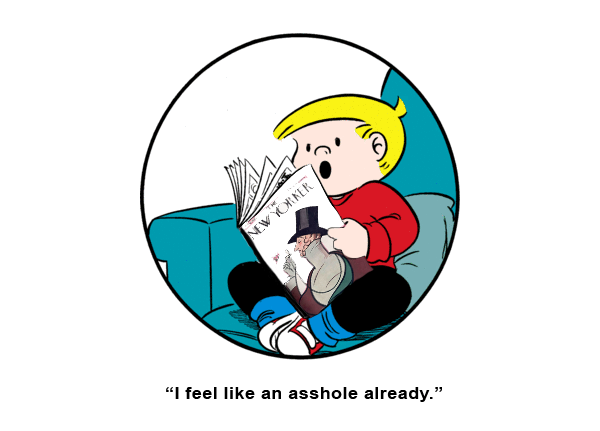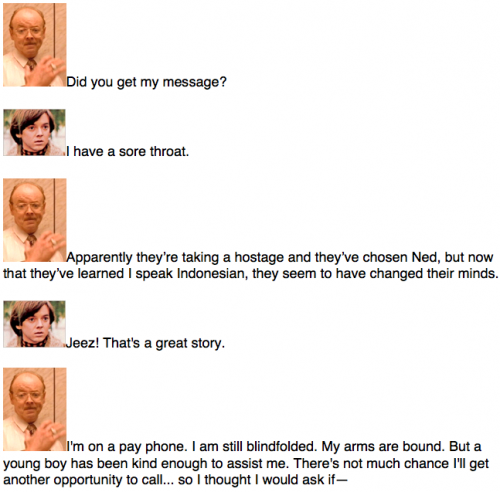Go Right Ahead: It is Friday
I broke my life.
But childhood prolonged. It becomes a hell.
My eyes and hearing are supernormal. I weigh 129 pounds. You can see what a diet of beer and light wine has made of me.
Do you understand the stopgap quality of hatred and rage?
The bridge besides the bridge of sighs.
Listening to the prisoned cricket.
And the hissing hair.
To drink dark beer with Mrs. Grant at four in the afternoon, under an umbrella, is a pleasure and a comfort.
Another entire bottle? I don’t know—let me drink on that.
See, it erases memory, as in grief, but arouses desire. So begins the cycle.
Stella spells ill.
To hell with that poem!
Honeysuckle blows by the granite.
In Defense of the Democratic, Therapeutic Workshop

This is in response to Kyle’s comment on Sean’s post. Or, maybe in reaction. In the comment thread, I responded to part of what Kyle said, but the rest of my response veers pretty far from what Sean was asking, so I’m going to develop it here instead.
I want to take up the ideas of workshop as democracy and workshop as therapy session. What does it mean, really, to say you don’t like those ideas? I should just let Kyle answer that first, but I’m going to say what I make of those terms first.
Workshop as democracy: If I was the one saying that, I would mean that a workshop is a chance to hear from a group of the kind of people who would be your readers. With nobody’s reading being privileged, including the professor’s, who is just one reader. The professor certainly is there to teach how to respond to peer work, how to read and respond sensitively, but hers shouldn’t be the final word. Bruce Covey was telling me last night that he never speaks during the workshops he teaches. Each workshop, a student facilitates. I think this is a wonderful idea. Sure, workshops can work beautifully in other ways, too, but I think this is one good way. This can come down to tiny details. It’s great to know whether 10% or 80% of readers don’t catch a certain reference. To be in control of that, of how obscure the references are. I prefer the perhaps squishy sounding term “focus group” to “democracy” for this function (not the only function, but one function) of a workshop.
Workshop as therapy session: This is thrown around a lot, always negatively. Workshop shouldn’t be therapy. I think there are two problems with this. One, what kind of therapy are we talking about. Substitute “person” in what Kyle says at the end. “…from there, to help a [person] do the thing the [person] really wants to do as powerfully and truly as the [person] can.” That can be (should be?) the goal of therapy, no? When I went to therapy, that’s what I was looking for, and I found it. This happened in many ways and on multiple levels, but I’ll use an example that has to do with writing. Toward the end of my course of therapy, my main problem was that I was behind on my thesis. (After I finished, my therapist said it was time I set new goals or quit therapy. I quit, and we kept in touch.) My therapist said, how about writing five pages a day (I think she said three at first, but I explained I wouldn’t make the deadline that way). I started writing five pages a day. I finished the thesis. I sent the critical component of the thesis–which was never workshopped–to someone I interviewed for it. He wanted me to adapt it for the magazine he edits. Made $1500 for the article. Didn’t pay for my whole course of therapy, but it more than covered the session where she said to just write 5 pages a day. Why shouldn’t a workshop do this?
2 Teach or not 2 Teach
What authors are the most accessible to being taught, especially to young writing students (as in taking their first classes, not age)? What authors are not?
Example. T.C. Boyle. Very teachable. Consistently uses structures easy to graph/visualize, massive layers of basic CW language techniques, always some intent at theme. Now you can argue the merits of his fiction, but that isn’t my point. My point is the merits of the fiction as pedagogically useful.
(You could take this one story and teach a semester of Intro CW: Freytag’s, quest narrative, suspense, immediacy, imaginative prose, precise verbs, unreliable narrator, suspense, POV, etc.)
Diane Williams. Not so great to teach. The voice, the thought, the paroxysms of perfect, and perfectly odd, sentences—you could smother a young writer, you could lead them to a cliff’s edge and accidentally push them off. (Yes, I know Miss Flannery O’Connor, this would do the world a favor, etc.)
Now I generalize, I generalize, so don’t go all sack of hammers. And I’m not saying don’t read any and every writer (OK, not Jewel). And, with upper level classes, I think the ratio switches—Personally, I start bringing in writers I wouldn’t teach earlier (like Diane Williams, Barry Hannah, Gertrude Stein, etc.) and I start removing T.C. Boyle. And I’m not saying you need to take any writing classes, ever—this question is couched in context. OK, enough with the disclaimers. WTF?
I just wonder if you have your own choices: A writer perfect for the teaching of creative writing to young writers, a writer you might want to avoid? I’m sure many of you have had experiences, as student or instructor. What authors glowed, what thunked?
“Use Your Icicles”: A Review of This Time We Are Both by Clark Coolidge
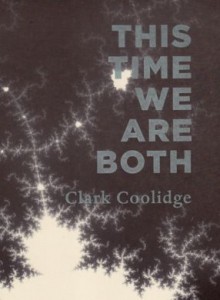 I. On January 13, 2011 a 6-year old boy was killed in downtown St. Petersburg by a giant icicle. This happened a block away from the apartment building where my grandmother used to live, two blocks away from the identical apartment building where my parents still live. The boy was an orphan, living with his grandparents. His grandmother was taking him to an outpatient clinic for a check-up after a recent cold. When he stepped outside his apartment building, the icicle became dislodged from the roof of the building and cracked the boy’s head. His grandmother, emerging from the building directly behind him, collapsed with a heart attack.
I. On January 13, 2011 a 6-year old boy was killed in downtown St. Petersburg by a giant icicle. This happened a block away from the apartment building where my grandmother used to live, two blocks away from the identical apartment building where my parents still live. The boy was an orphan, living with his grandparents. His grandmother was taking him to an outpatient clinic for a check-up after a recent cold. When he stepped outside his apartment building, the icicle became dislodged from the roof of the building and cracked the boy’s head. His grandmother, emerging from the building directly behind him, collapsed with a heart attack.
The next day, the press was astir trying to establish the party responsible for this incident. Who was to blame: the building, the block, the district, or the city administration? For a city located at the latitude of 60°N, St. Petersburg has been criminally poorly prepared for snow. Snow somehow always comes as a surprise in St. Petersburg. A few days after the death of the boy, as a bomb exploded in Moscow’s airport, St. Petersburg had another snow-related disaster: the roof of a mega-market “O’Key” caved in under a giant pile of snow. One person died and seventeen were injured.
Counter to its reputation, St. Petersburg doesn’t enjoy long, cold “Russian” winters. Instead, the flashes of cold weather alternate with periods of thaw, when snow melts forming ice on the ground and ice on the roofs of the buildings, from which snow has not been cleaned off. The last two years saw unusually high levels of snowfall—and the icicles have also grown to massive proportions. Theoretically, cleaning the roofs of the apartment buildings is a daily job. Practically, who is going to pay for it? And where to find workers willing to do the job? Money in the city’s budget allocated toward infrastructure needs has a tendency to mysteriously dematerialize. In the aftermath of the recent deaths, St. Petersburg’s governor Valentina Matvienko has proposed using the homeless as the workforce to clean the snow, and also developing laser technology to get rid of the snow “scientifically.”
II. The news of St. Petersburg’s latest battles with snow gather in my inbox as I’m in the middle of reading and rereading Clark Coolidge’s book-length poem This Time We Are Both, published in 2010 by Ugly Duckling Presse. The title is the first thing that grabs my attention. READ MORE >
February 18th, 2011 / 1:25 pm
The words “Sam Pink” scroll through my headhole in big neon letters
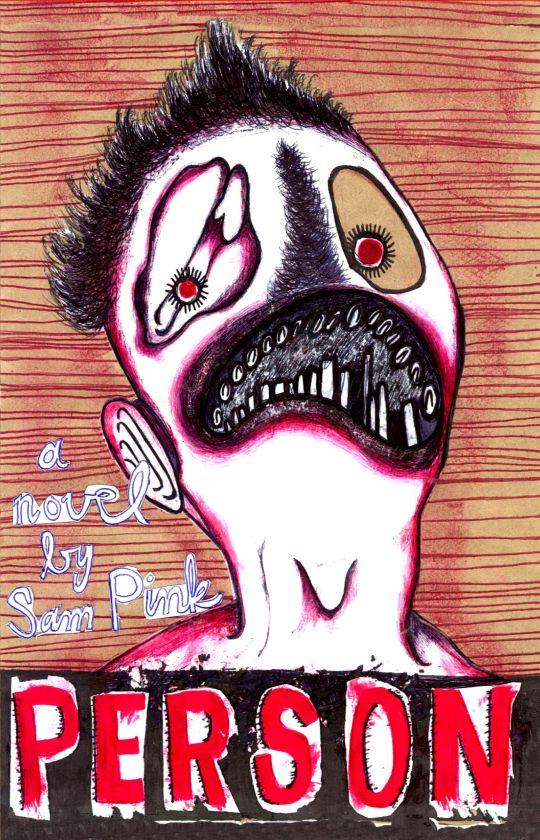
I feel like Person by Sam Pink, published by Lazy Fascist Press, is, as Ann Beattie said of Wittgenstein’s Mistress, “a novel that can be parsed like a sentence.”
What I mean is the sentences, one per paragraph one by one, slowly present an image of existence—particular, funny, sad, moving, and sometimes surprising.
The book is thematic at the language level, and phrases recur mantra-like.
“It feels like practice,” Sam writes, again and again.
February 18th, 2011 / 12:32 pm
When I was a painter
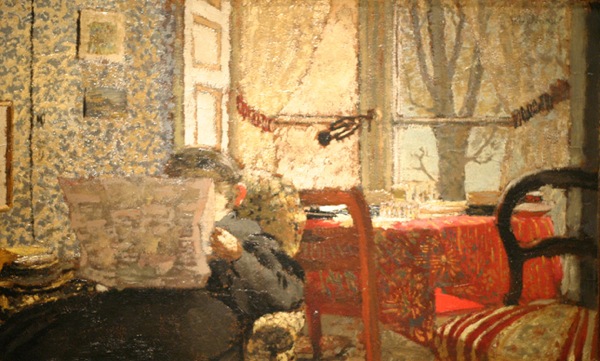
“When I was a painter” is a Breeders song, and it is also the title of this, though this is less about when I was a painter than “how I became a writer,” quoted because just saying it aloud inside my muggy mouth makes me somewhat nauseous and sorry for this readership, whose patience towards personal essays is confounding. See? I just used a big word.
When I was a painter I painted scenes across the street, a kind of pedestrian voyeurism without any boners; just simple things like a street lamp’s effect on a wall; the inadvertent faint line of a curb; or how shadows are never dark, just comprised of shapes of darker light. I had paint splotches all over my jeans like Basquiat, though only he got laid.
When I was a painter I looked at Pierre Bonnard, Edouord Vuillard, and Giorgio Morandi. They were all sensitive men, perhaps “fags” in today’s world — fags with wives, OCD tendencies, and a slow silent life somewhere in Europe. I went to Europe once. The food was okay, the weather was bad. Painting is beautiful because there is no talking, only looking, and looking again.
Temporary Coagulations: a quick look at A Thousand Years of Nonlinear History
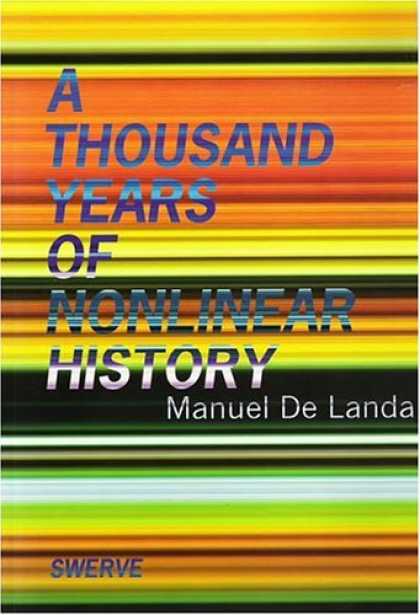
Finished this today. I started it a few years back and put it down; the introduction seemed a bit impenetrable. Then, last year, as I was driving through Yosemite park, I thought of the trees as temporary spikes in the surface of the earth. I felt my environment as process. I blamed this book. I started it up again about two weeks ago. It’s a beautiful synthesis of thought; philosophical in the sense that this book is a unique engagement with the world that is often contagious, often revealing. Manuel De Landa presents the last thousand years through three lenses: biological history, geological history, and linguistic history. I found the first two the most interesting. The interplay of gene flows, biomass, disease, and the changing infrastructural landscape of civilization is fun to watch. These are complex processes, and this book makes you feel as if you can suss out the true influences in major movement. To me, this is the most honest, wide-eyed & ecologically sensitive concept of history that I’ve read. Humans aren’t the heroes: self-organizing flows of energy are. We are just mineralizations, temporary coagulations. From one clot to another: read this.
February 18th, 2011 / 12:09 am


